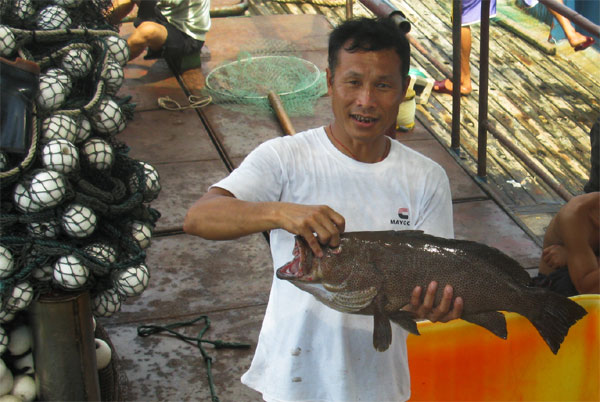Upgrade to boost island chains
Updated: 2012-07-02 01:48
By Hu Yongqi, Wu Wencong in Beijing and Huang Yiming in Haikou (China Daily)
|
|||||||||||
 |
|
Residents have been fishing in the waters around Sansha since 1681. Liu Wei / for China Daily |
Real town in waters
At 2.13 sq km and with a population of 2,000, Yongx+ing Island is the biggest in the South China Sea, according to Cai Damao, 50, a farmer who has lived there for 12 years.
The residents of other islands may be envious of those who live on Yongxing, which has had a hospital and post office for several decades. Residents can transfer money at a branch of the Industrial and Commercial Bank of China and basic, daily supplies are available at the island's supermarket.
Cai, who has supplied islanders with vegetables since 2000, is content with life in this isolated spot. The soldiers use diesel generators to produce electricity and there's more than enough to enable the use of electric lighting and cooking equipment and air conditioners began to replace fans once residents realized that there was no need to worry about power shortages.
Islanders and soldiers have been collecting rainwater for years. Alongside the runway at the airport, five containers, each with a capacity of 1,000 cubic meters, were installed to collect rainwater that's used by the residents after purification. "Water is not a problem anymore, compared with 12 years ago," Cai said.
A decade ago, it was common to see people waiting in line to telephone their families on Hainan Island or the mainland. However, few begrudged the long wait to use the telephone because they knew they would eventually get to speak to family members and friends. That has now changed, "We can use mobile phones and don't have to worry about the signal. We can even access third-generation networks," said Cai.
Qiongsha 3, a supply boat from Wenchang city in Hainan province, 330 km from Yongxing, provides a monthly delivery of drinking water, food and other items, weather permitting.
Over the years, the island community has developed into a small town, indistinguishable from any on the mainland, according to Cai. "There is no difference between Yongxing Island and my hometown in Hubei," he said.
Currently, tours by large parties are limited because the island's infrastructure will not support a large influx of visitors, but small groups have managed trips. Ma Xiaodong, a 28-year-old tour guide, recently took three people on a four-day trip to Yongxing Island that cost 5,800 yuan ($913) per person.
"Communication on the island is convenient, with very good cell phone reception," he said. "There is also a supermarket selling items at a relatively low price. A box of instant noodles only cost 4 yuan, the same as in Haikou, the provincial capital."
Things look set to change. A new tourist hostel opened on Yongxing a month ago, boasting better facilities than its predecessor, a three-story building with 18 rooms, but no hot water or air conditioning. Despite its failing, the old hostel charged as much as 800 yuan for a room.
Ma said the Xisha Islands are tranquil, peaceful, unspoiled and beyond compare with the other islands he has visited. The move to establish Sansha has given him great hope for the development of the tourist industry.
Evolution in decades
Cai, a native of Hubei province, was unmarried when he arrived on the island in 2000. He discovered that only three of the 517 registered residents were female. "With more people coming to the island, more girls are arriving and so the young men can find a wife. Sometimes I joke with my wife, who hails from Hainan Island, that if I had arrived here 10 years later, I would probably have married a local girl," he said.
Other things have changed too, with healthcare being just one of the areas of improvement. For many years, Xisha Nansha Zhongsha People's Hospital, founded in 1959, was the only medical center. The harsh conditions on the island meant that staff members were unwilling to stay permanently and so doctors and nurses from top hospitals in Hainan province rotated every six months.
The old two-story building was unable to provide comprehensive treatment because the facilities consisted of just hyperbaric oxygen equipment, an electro-retinography machine, a urine analyzer and a surgical table.
Li Dan, a nurse at Hainan Provincial Nongken Hospital, was waiting for Qiongsha 3 to take her back to Hainan Island after a six-month stint on Yongxing. In addition to her medical work on Yongxing, she also became a sort of accountant, balancing the demand and supply of medicine and when the monthly delivery arrived, she transported the supplies to the hospital by herself.
She also had to develop "sea legs" to cope with the numerous short voyages she and her colleagues undertook to treat patients on other islands. Despite the hardships, she said that she has enjoyed her first stay on Yongxing and is eager to return.
If Li does manage to undertake a second stint on the island, she will find that the facilities have improved. The National Development and Reform Commission provided 18 million yuan in February to build a new 30-bed hospital, which is expected to be operational by the end of the year, providing extended medical care for the residents.
Today's Top News
President Xi confident in recovery from quake
H7N9 update: 104 cases, 21 deaths
Telecom workers restore links
Coal mine blast kills 18 in Jilin
Intl scholarship puts China on the map
More bird flu patients discharged
Gold loses sheen, but still a safe bet
US 'turns blind eye to human rights'
Hot Topics
Lunar probe , China growth forecasts, Emission rules get tougher, China seen through 'colored lens', International board,
Editor's Picks

|

|

|

|

|

|





